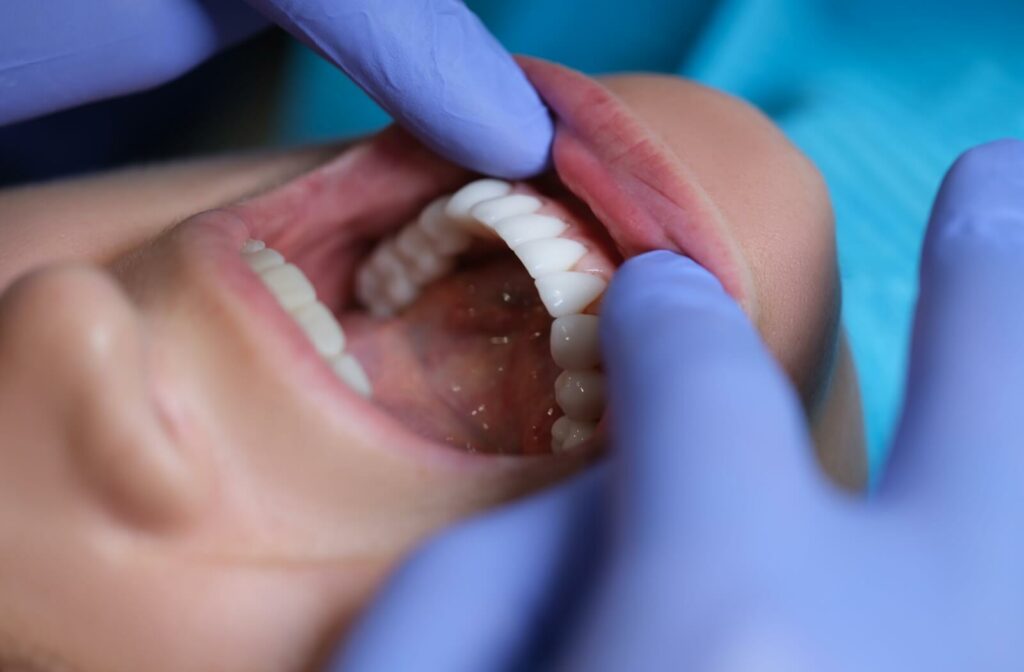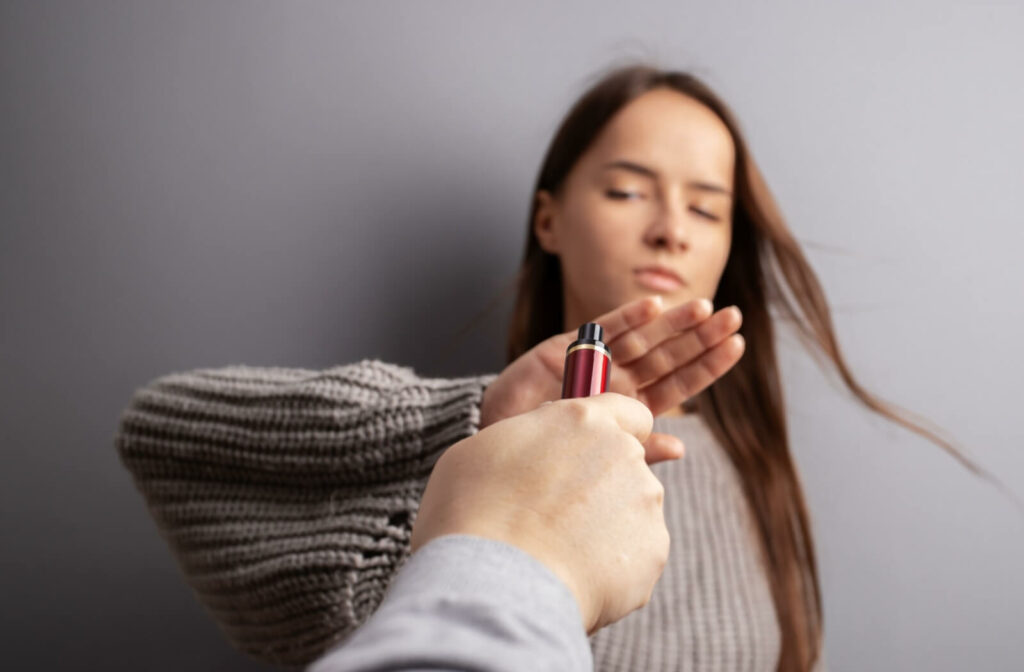Vaping involves inhaling vapour produced by an electronic cigarette or similar device. These devices heat a liquid—usually containing nicotine, flavourings, and other chemicals—into an aerosol that users then inhale.
Though vaping may not have the same ill effects on our health as traditional cigarettes, it can still harm your teeth and overall oral health. In particular, vaping can lead to symptoms like dry mouth and an increased risk of gum disease or tooth decay.
While many consider vaping a safer alternative to smoking, concerns about its effects on health, especially oral health, are growing. It’s important to let your dentist know if you vape during your next dental exam, as they can provide tailored advice on taking care of your oral health.
The Impact of Vaping on Oral Health
Vaping might be marketed as a less harmful alternative to smoking, but it still has negative implications for oral health. When you vape, you expose your mouth to various chemicals, which can potentially harm your teeth and gums. The vapour’s high temperatures and chemical composition can lead to several issues, including oral tissue inflammation and a change in the mouth’s microbiome.
These effects are not just superficial. Over time, regular vaping can contribute to more severe dental problems. By understanding these risks, you can take proactive steps to protect your oral health while continuing to enjoy your vaping habit.
Research Highlights on Vaping & Dental Health
Multiple studies have explored the link between vaping and oral health, with some alarming findings. Research indicates that vaping can significantly alter the bacterial composition of your mouth, making it more conducive to dental issues like cavities and gum disease.
One study found that vaping increases the risk of gum inflammation and gum disease. Another study highlighted that e-cigarette users are prone to oral lesions, which can be painful and potentially lead to more serious conditions if left untreated.
These findings suggest that, while vaping might feel less harsh on your lungs compared to smoking, it still poses significant risks to your oral health that should not be overlooked.
Dental Issues Linked to Vaping
Let’s explore a few potential dental issues that vaping can contribute to.
Dry Mouth
One of the most immediate effects of vaping is dry mouth. The propylene glycol in e-liquids absorbs moisture, leading to decreased saliva production. Saliva is crucial for neutralizing acids and washing away food particles, so a dry mouth can increase the risk of cavities and bad breath.
Gum Disease
Vaping can contribute to the development of gum disease. The nicotine in e-liquids reduces blood flow to the gums, impairing the healing process and making the gums more susceptible to infections and disease. Over time, this can lead to advanced periodontal disease, potentially resulting in tooth loss.
Tooth Decay
The flavourings and sweeteners in e-liquids can be a breeding ground for cavity-causing bacteria. When these bacteria feed on the sugars, they produce acids that erode tooth enamel, leading to increased tooth decay.

Oral Health Tips for Vapers
Ideally, in order to optimize health, one would reduce or eliminate vaping to prevent the potential risks. But there are still things you can do to keep your mouth healthy.
Maintain Good Oral Hygiene
Brush your teeth at least twice a day and floss daily. Use fluoride toothpaste to strengthen your enamel and reduce the risk of cavities. An antibacterial mouthwash can also be a great addition to your oral hygiene routine, but it shouldn’t replace proper brushing and flossing.
Stay Hydrated
Drink plenty of water to counteract the drying effects of vaping. Staying hydrated helps maintain saliva production and supports overall oral health.
Regular Dental Check-Ups
Visit your dentist regularly for exams and cleanings. Inform them about your vaping habits so they can provide tailored advice and monitor any potential issues.
Ingredients Matter
E-liquids contain various ingredients, including propylene glycol, glycerin, flavourings, and nicotine. Each of these components can affect your oral health in different ways. For example, propylene glycol can cause dry mouth, while certain flavourings might be acidic and erode tooth enamel.
Nicotine’s Impact
Nicotine is a vasoconstrictor that narrows blood vessels and restricts blood flow. This reduced blood flow can impair your gums’ ability to heal and fight off infections, increasing the risk of periodontal disease.
Discuss Your Vaping Habits with Your Dentist
Vaping might seem like a harmless alternative to smoking, but its effects on oral health can be significant and concerning. From dry mouth and gum disease to tooth decay, the implications of vaping are far-reaching. By staying informed, practicing good oral hygiene, and seeking professional advice, you can mitigate these risks and maintain a healthy smile.
If you’re concerned about the impact of vaping on your oral health, call our team at Shin Dentistry. One of our experienced dentists can provide valuable insights and help you develop a plan to protect your teeth and gums.



